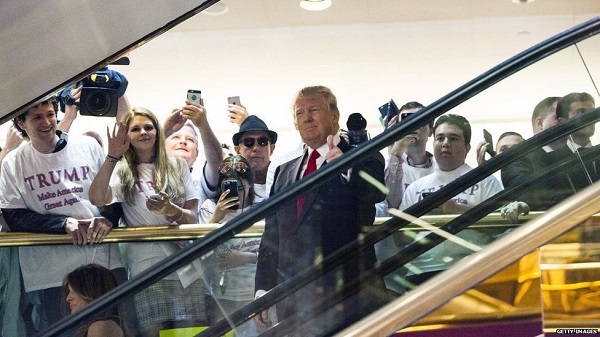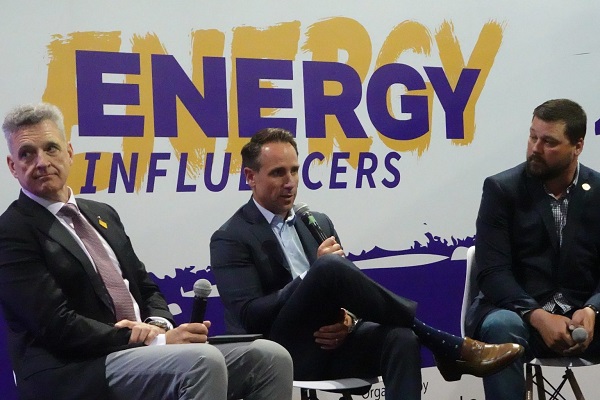Uncategorized
Trump closer to declaring emergency; 800,000 won’t get paid

WASHINGTON — President Donald Trump is edging closer to declaring a national emergency to fund his long-promised border wall, as pressure mounts to find an escape hatch from the three-week impasse that has closed parts of the government, leaving hundreds of thousands of workers without pay.
Some 800,000 workers, more than half of them still on the job, were to miss their first
Asked about the plight of those going without pay, the president shifted the focus, saying he felt badly “for people that have family members that have been killed” by criminals who came over the border.
Trump visited McAllen, Texas, and the Rio Grande on Thursday to highlight what he calls a crisis of drugs and crime. He said that “if for any reason we don’t get this going” — an agreement with House Democrats who have refused to approve the $5.7 billion he demands for the wall — “I will declare a national emergency.”
Trump was consulting with White House attorneys and allies about using presidential emergency powers to take unilateral action to construct the wall over the objections of Congress. He claimed his lawyers told him the action would withstand legal scrutiny “100
Such a move to bypass Congress’
A congressional official said the White House has directed the Army Corps of Engineers to look for billions of dollars earmarked last year for disaster response for Puerto Rico and other areas that could be diverted to a border wall as part of the emergency declaration. The official spoke on the condition of anonymity because the official was not authorized to speak publicly.
“We’re either going to have a win, make a compromise — because I think a compromise is a win for everybody — or I will declare a national emergency,” Trump said before departing the White House for his politically
It was not clear what a compromise might entail, and there were no indications that one was in the offing. Trump says he won’t reopen the government without money for the wall. Democrats say they
Republican Sen. Lindsey Graham of South Carolina said at one point that he didn’t “see a path in Congress” to end the shutdown, then stated later that enough was enough: “It is time for President Trump to use emergency powers to fund the construction of a border wall/barrier.”
Visiting a border patrol station in McAllen, Trump viewed tables piled with weapons and narcotics. Like nearly all drugs trafficked across the border, they were intercepted by agents at official ports of entry, he was told, and not in the remote areas where he wants to extend tall barriers.
Still, he declared: “A wall works. … Nothing like a wall.”
He argued that the U.S. can’t solve the problem without a “very substantial barrier” along the border, but offered exaggerations about the effectiveness of border walls and current apprehensions of those crossing illegally.
Sitting among border patrol officers, state and local officials and military representatives, Trump insisted he was “winning” the shutdown fight and criticized Democrats for asserting he was manufacturing a sense of crisis in order to declare an emergency. “What is manufactured is the use of the word ‘manufactured,'” Trump said.
As he arrived in Texas, several hundred protesters near the airport in McAllen chanted and waved signs opposing a wall. Across the street, a smaller group chanted back: “Build that wall!”
In Washington, federal workers denounced Trump at a rally with congressional Democrats, demanding he reopen the government so they can get back to work.
On Capitol Hill, House Speaker Nancy Pelosi accused the president of engaging in political games to fire up his most loyal supporters, suggesting that a heated meeting Wednesday with legislators at the White House had been “a setup” so that Trump could walk out of it.
In an ominous sign for those seeking a swift end to the showdown, Trump announced he was
The partial shutdown would set a record early Saturday, stretching beyond the 21-day closure that ended Jan 6, 1996, during President Bill Clinton’s administration.
___
Associated Press writers Jill Colvin, Colleen Long, Alan Fram, Deb Riechmann and Zeke Miller in Washington and Nomaan Merchant in McAllen, Texas, contributed to this report.
___
For AP’s complete coverage of the U.S. government shutdown: https://apnews.com/GovernmentShutdown
Catherine Lucey, Lisa Mascaro And Zeke Miller, The Associated Press
Uncategorized
Kananaskis G7 meeting the right setting for U.S. and Canada to reassert energy ties


Energy security, resilience and affordability have long been protected by a continentally integrated energy sector.
The G7 summit in Kananaskis, Alberta, offers a key platform to reassert how North American energy cooperation has made the U.S. and Canada stronger, according to a joint statement from The Heritage Foundation, the foremost American conservative think tank, and MEI, a pan-Canadian research and educational policy organization.
“Energy cooperation between Canada, Mexico and the United States is vital for the Western World’s energy security,” says Diana Furchtgott-Roth, director of the Center for Energy, Climate and Environment and the Herbert and Joyce Morgan Fellow at the Heritage Foundation, and one of America’s most prominent energy experts. “Both President Trump and Prime Minister Carney share energy as a key priority for their respective administrations.
She added, “The G7 should embrace energy abundance by cooperating and committing to a rapid expansion of energy infrastructure. Members should commit to streamlined permitting, including a one-stop shop permitting and environmental review process, to unleash the capital investment necessary to make energy abundance a reality.”
North America’s energy industry is continentally integrated, benefitting from a blend of U.S. light crude oil and Mexican and Canadian heavy crude oil that keeps the continent’s refineries running smoothly.
Each day, Canada exports 2.8 million barrels of oil to the United States.
These get refined into gasoline, diesel and other higher value-added products that furnish the U.S. market with reliable and affordable energy, as well as exported to other countries, including some 780,000 barrels per day of finished products that get exported to Canada and 1.08 million barrels per day to Mexico.
A similar situation occurs with natural gas, where Canada ships 8.7 billion cubic feet of natural gas per day to the United States through a continental network of pipelines.
This gets consumed by U.S. households, as well as transformed into liquefied natural gas products, of which the United States exports 11.5 billion cubic feet per day, mostly from ports in Louisiana, Texas and Maryland.
“The abundance and complementarity of Canada and the United States’ energy resources have made both nations more prosperous and more secure in their supply,” says Daniel Dufort, president and CEO of the MEI. “Both countries stand to reduce dependence on Chinese and Russian energy by expanding their pipeline networks – the United States to the East and Canada to the West – to supply their European and Asian allies in an increasingly turbulent world.”
Under this scenario, Europe would buy more high-value light oil from the U.S., whose domestic needs would be back-stopped by lower-priced heavy oil imports from Canada, whereas Asia would consume more LNG from Canada, diminishing China and Russia’s economic and strategic leverage over it.
* * *
The MEI is an independent public policy think tank with offices in Montreal, Ottawa, and Calgary. Through its publications, media appearances, and advisory services to policymakers, the MEI stimulates public policy debate and reforms based on sound economics and entrepreneurship.
As the nation’s largest, most broadly supported conservative research and educational institution, The Heritage Foundation has been leading the American conservative movement since our founding in 1973. The Heritage Foundation reaches more than 10 million members, advocates, and concerned Americans every day with information on critical issues facing America.
Uncategorized
Poilievre on 2025 Election Interference – Carney sill hasn’t fired Liberal MP in Chinese election interference scandal

From Conservative Party Communications
“Yes. He must be disqualified. I find it incredible that Mark Carney would allow someone to run for his party that called for a Canadian citizen to be handed over to a foreign government on a bounty, a foreign government that would almost certainly execute that Canadian citizen.
“Think about that for a second. We have a Liberal MP saying that a Canadian citizen should be handed over to a foreign dictatorship to get a bounty so that that citizen could be murdered. And Mark Carney says he should stay on as a candidate. What does that say about whether Mark Carney would protect Canadians?
“Mark Carney is deeply conflicted. Just in November, he went to Beijing and secured a quarter-billion-dollar loan for his company from a state-owned Chinese bank. He’s deeply compromised, and he will never stand up for Canada against any foreign regime. It is another reason why Mr. Carney must show us all his assets, all the money he owes, all the money that his companies owe to foreign hostile regimes. And this story might not be entirely the story of the bounty, and a Liberal MP calling for a Canadian to be handed over for execution to a foreign government might not be something that the everyday Canadian can relate to because it’s so outrageous. But I ask you this, if Mark Carney would allow his Liberal MP to make a comment like this, when would he ever protect Canada or Canadians against foreign hostility?
“He has never put Canada first, and that’s why we cannot have a fourth Liberal term. After the Lost Liberal Decade, our country is a playground for foreign interference. Our economy is weaker than ever before. Our people more divided. We need a change to put Canada first with a new government that will stand up for the security and economy of our citizens and take back control of our destiny. Let’s bring it home.”
-

 Business2 days ago
Business2 days agoCanada’s critical minerals are key to negotiating with Trump
-

 Business23 hours ago
Business23 hours agoSenator wants to torpedo Canada’s oil and gas industry
-

 espionage1 day ago
espionage1 day agoFrom Sidewinder to P.E.I.: Are Canada’s Political Elites Benefiting from Beijing’s Real Estate Reach?
-

 Bruce Dowbiggin22 hours ago
Bruce Dowbiggin22 hours agoFUBAR: How Trudeau & Trump Rewrote This Century’s Political Handbook
-

 Business2 days ago
Business2 days agoRFK Jr. planning new restrictions on drug advertising: report
-

 Alberta1 day ago
Alberta1 day agoAlberta’s carbon diet – how to lose megatonnes in just three short decades
-

 Energy1 day ago
Energy1 day agoWho put the energy illiterate in charge?
-

 espionage1 day ago
espionage1 day agoFBI Buried ‘Warning’ Intel on CCP Plot to Elect Biden Using TikTok, Fake IDs, CCP Sympathizers and PRC Students—Grassley Probes Withdrawal






